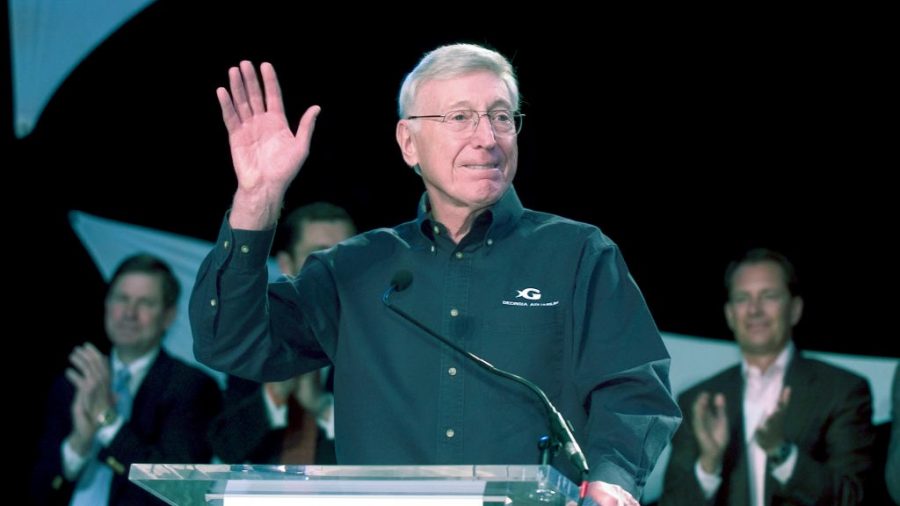Bernard “Bernie” Marcus, the billionaire co-founder of Home Depot and a prominent Republican donor, has passed away at age 95, the company announced on Tuesday.
“The entire Home Depot family is deeply saddened by the death of our cofounder Bernie Marcus,” the company said in a statement on X. “We owe an immeasurable debt of gratitude to Bernie. He will be tremendously missed.”
Known for his business acumen, philanthropy, and vocal political stances, Marcus left a lasting legacy on American retail and the city of Atlanta, where he co-founded Home Depot in 1979 with Arthur Blank.
The pair would conquer the hardware industry with their concept of a large-scale one-stop shop for do-it-yourself homeowners—something that didn’t exist at the time in home improvement retail.
“Bernie was an inspiration in many ways,” the company said in a news release. “He loved our customers. He also loved the associates who made the company what it is today.”
Today, Home Depot has grown into a multinational powerhouse of over 2,300 stores, employing more than half a million people.
Home Depot is valued at nearly $400 billion on the stock market. According to Bloomberg’s Billionaires Index, Marcus has an estimated net worth of $7.4 billion.
Marcus was born in 1929 in Newark, New Jersey, to Russian Jewish immigrants. Raised in a working-class family as the youngest of four siblings, he dreamed of becoming a doctor.
When his family couldn’t afford medical school, he enrolled in pharmacy school and received a degree from Rutgers University. According to Home Depot, Marcus said he’d often cut classes to sell freezers door-to-door.
His early career took him into the retail industry, where he held positions with various chains before landing at Handy Dan Home Improvement in California. It was there that he met Blank.
After both were dismissed by new management, they decided to create their own business—one that would redefine home improvement retail.
In 1979, the first Home Depot store opened in Atlanta. Marcus was 49 at the time. Under his leadership as CEO until 1997, and as chairman until his retirement in 2002, the company became a major player in the retail world.

Giving Back
“He was a master merchant and a genius with customer service,” Home Depot said. However, the successful businessman “never lost sight of his humble roots, using his success not for fame or fortune but to generously help others.”
In 1999, Marcus, Blank, and Home Depot financier Ken Langone started The Homer Fund to help Home Depot employees who suffer unexpected hardships. According to the company, The Homer Fund has helped more than 194,000 employees since its inception.
Home Depot cited Marcus as saying: “My mother taught me to be generous. She believed that the more you give, the more you get.”
Marcus’ philanthropy wasn’t limited to his employees and business associates. With his wife Billi, he founded the Marcus Autism Center at Emory University, which supports children with developmental disabilities.
He also donated extensively to Jewish causes, medical organizations, and other community initiatives. Among his most famous contributions is a $250 million grant that helped establish the Georgia Aquarium, one of the largest in the world, in 2005.
Marcus also contributed to the creation of the Marcus Trauma Center at Grady Memorial Hospital and the Marcus Heart and Vascular Center at Piedmont Hospital in Atlanta.
Old School American
Politically, Marcus was known for his outspoken support of Republican causes and conservative views. Over the years, he donated millions to GOP candidates, including John McCain, Florida Governor Ron DeSantis, and former President Donald Trump.
His support for Trump led to calls for boycotts of Home Depot in 2016 and 2019, though he had already retired from the company years before.
Marcus often voiced concerns about the state of capitalism in the United States, attributing challenges to what he called a rising “socialist” mindset.
In a 2022 interview with the Financial Times, Marcus said that he and Blank wouldn’t have been able to achieve anything near the success that they had in the current climate, as he expressed his worry about modern Americans’ work ethic and the rise of “woke people” in mainstream and social media.
“We used to have free speech here. We don’t have it,” he told the newspaper. “The woke people have taken over the world. You know, I imagine today they can’t attack me. I’m 93.”
Marcus leaves behind a legacy in business, philanthropy, and public life. From building an empire that transformed retail to funding hospitals and educational centers, his impact on American society, and Atlanta in particular, will be remembered for years to come.

